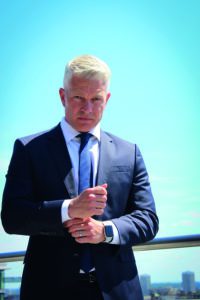 As head of EMEA equity trading at the world’s largest asset manager, no two days are the same for Paul Battams. Despite managing the team of 14 traders at BlackRock that cover equities and equity derivatives across the region, Battams still executes frequently and remains connected and plugged into the market each day.
As head of EMEA equity trading at the world’s largest asset manager, no two days are the same for Paul Battams. Despite managing the team of 14 traders at BlackRock that cover equities and equity derivatives across the region, Battams still executes frequently and remains connected and plugged into the market each day.
BlackRock operates globally via centralised dealing desks around the world with local traders overseeing trading and execution in each region. For EMEA, the desk is broad in terms of the products that it trades with a mixture of passive, fundamental active, systematic active and derivatives transactions, meaning at least one segment of the desk is always extremely busy.
With an emphasis on the importance of his team, Battams explains there are subject matter experts that focus on specific areas, whether that be specialists on rebalance activity or a more quantitative skillset that is employed across the desk.
“Each trader has a high degree of core skills and competency that allows us to move flow around the desk as required,” he adds. “Every year we execute more and more in terms of notional and orders so the focus for us is scale, efficiency, resiliency and risk management across the platform.”
As for many buy-side houses, 2020 presented a huge challenge for BlackRock, but Battams says the firm’s investment in technology and its platform over the years has paid dividends. Given its size and resources, the asset manager uses a lot of in-house systems and its flagship Aladdin platform is at the heart of trading workflows. The EMEA equity desk at BlackRock executes roughly 12,000 orders a day, meaning electronic connectivity is essential in being able to handle flow and risk effectively.
With Aladdin as its order management system (OMS), orders are sent to the platform electronically. There are robust portfolio manager and trader protocols in place that govern how portfolio managers submit orders to the traders and how they are tagged to ensure the trading desk can manage the vast number of orders systematically.
“Looking at the benchmark, the aim is to achieve what the fund and trade objectives are,” Battams explains. “There is no manual keying of orders or trade information, which allows the trader to concentrate fully on the execution rather than on processing. Straight through connectivity is key for the team and gives traders the bandwidth to focus on execution and sourcing liquidity.”
BlackRock has its own transaction cost analysis (TCA) system that traders can use to interrogate data across various lenses and benchmarks for cost evaluations. The traders also benefit from a global trading research team that is dedicated to TCA given the huge amount of data that flows into BlackRock on a daily basis.
“I guess that’s one of the benefits we have as BlackRock, we have so much data and we are ready and able to drill down to define data-driven strategies going forward,” Battams adds. “It’s a differentiator for us, and it is a core part of any trader’s skillset today in terms of understanding data across the platform.”
Relationships with the sell-side are also key. Battams says that partnerships with brokers have become even more critical as markets have become increasingly more fragmented and complex. The events of 2020 and increased market volatility, which is yet to fully normalise, has placed even greater emphasis on strong relationships with the sell-side, but also with electronic platforms.
“The sell-side will always be important to the buy-side, but the platforms are becoming more entwined as we think about connectivity to the market,” Battams says. “We try to mitigate dependency. We don’t want to be too dependent on a single venue or counterparty. It’s important that we remain agile and are able to adapt and be flexible in any situation.”
Leading by example
 Battams has been with BlackRock for 21 years, including a decade with Barclays Global Investors which the global asset manager acquired in 2009. Fresh out of university with a degree in engineering and business management, Battams secured a job as a clerk on the trading floor at the London International Financial Futures and Options Exchange (LIFFE). The role would spark his interest in markets and cement plans to pursue a career in trading.
Battams has been with BlackRock for 21 years, including a decade with Barclays Global Investors which the global asset manager acquired in 2009. Fresh out of university with a degree in engineering and business management, Battams secured a job as a clerk on the trading floor at the London International Financial Futures and Options Exchange (LIFFE). The role would spark his interest in markets and cement plans to pursue a career in trading.
“As a futures and options trading clerk I was blown away by how exciting and vibrant it was – running around the trading floor in a yellow jacket doing the jobs for the traders in the pit,” Battams says.
“Not long after, the funny hand signals and open outcry nature of trading shifted very quickly to electronic. I was astonished at how rapidly the trading floor essentially disappeared. In those days, the market would sometimes trade at different prices in different spots of the open outcry pit. It was nowhere near as efficient and connected as it is today.”
At Barclays Global Investors, Battams worked in operations doing equity confirmation and settlement before securing a role on the trading desk executing equities. Gradually, the products he traded expanded alongside his skillset and responsibilities before BlackRock’s landmark acquisition of Barclays Global Investors, which would make the firm the largest fund manager globally.
Battams says that every day at BlackRock as head of EMEA equity trading is unique. At the start of a typical day, he plugs into the market, investment teams and traders to ensure everyone is prepared to navigate the constantly changing landscape. At the same time, he communicates with clients, deals with risk, examines TCA data and analytics, and manages strategic projects more broadly within the firm.
“It feels like everything is changing so quickly all the time – market microstructure, regulation, the liquidity landscape,” Battams explains. “We must look forward the entire time to make sure we have appropriate resources and that we’re investing in the right places for future growth. Looking at my role and everything combined, each day is different and that’s what I like most about it.”
Describing his approach to leadership, Battams says he values an open, transparent and direct style, always leading by example. He also places great value on connectivity to all team members to leverage their strengths and build on their weaknesses for the benefit of the desk.
His achievements as a buy-side trading leader have been recognised recently by the industry as part of The TRADE’s Leaders in Trading 2020 Buy-side Awards. Battams was nominated in the long-only category and crowned ‘Trader of the Year’ following an intense market-wide vote.
 “It’s the team that makes the desk such a success and so for me, team motivation and morale are extremely important,” he says. “We spend such a huge amount of time together, more than we do with our families, so we want to make this a great place to work and have some fun too. Some camaraderie across the desk makes it a much more appealing place to work.”
“It’s the team that makes the desk such a success and so for me, team motivation and morale are extremely important,” he says. “We spend such a huge amount of time together, more than we do with our families, so we want to make this a great place to work and have some fun too. Some camaraderie across the desk makes it a much more appealing place to work.”
Battams defines the culture at BlackRock as inclusive, which he considers critical given that the purpose of major financial institutions is to help people experience and expect financial wellbeing. To foster a greater sense of creativity and innovation with a high-performing team that gets results, he says everything starts with the people.
A major focus for Battams in pushing forward the long-standing success of his team recently has been mental health. With the events of 2020, the ongoing global pandemic and its impact on everyone’s working environment, the unique experiences and needs of colleagues came to the fore for many in the industry.
As work and home life boundaries have become somewhat blurred, BlackRock has devised new strategies to help its staff manage those challenges. For example, the EMEA equity trading desk now has no meetings on Friday afternoons.
The new policy aims to encourage a smoother transition for traders as they enter the weekend and allows time to catch up with any admin or colleagues as the working week draws to a close. Battams says small initiatives like that help boost morale across the team, but more importantly, raise awareness of wellbeing and mental health.
“As a leader, the wellbeing of my team is a top priority for me – it’s paramount for motivation and morale. We need to raise awareness of mental health, destigmatise what it means for people and become more comfortable with talking about it,” he says.
“Being aware of each other, mindful of everyone’s individual needs and not feeling afraid to reach out for help when we need to is extremely important. That’s how we get the best out of people. It is all part of the ingredients that come together and make this a great place to work.”
Lift and shift
While his team are at the forefront of his thinking as a leader at BlackRock, Battams must also navigate the changing execution and regulatory landscape. Most recently, developments following the UK’s exit from the European Union have brought regulatory divergence into focus.
As the UK has confirmed plans to scrap dark trading rules and certain research requirements implemented under Europe’s MiFID II, BlackRock continues to be supportive of mid-point liquidity, trading in dark venues and transparency. For Battams, divergence isn’t particularly ideal, but he recognises the opportunity Brexit has presented the UK in terms of creating a new market environment.
 “We like global platforms and consistency, particularly when it comes to market structure. However, the UK has the chance to make changes to the MiFID regime in areas that are considered burdensome and superfluous to requirements, which will benefit the industry and ultimately our clients,” Battams explains.
“We like global platforms and consistency, particularly when it comes to market structure. However, the UK has the chance to make changes to the MiFID regime in areas that are considered burdensome and superfluous to requirements, which will benefit the industry and ultimately our clients,” Battams explains.
“Post-Brexit we definitely saw the migration of liquidity from UK venues to EU venues, but for me, I saw that as more of a lift and shift rather than a significant increase in fragmentation. Considering the planning and preparation for Brexit, I think it was a relatively smooth transition. Nothing broke from an execution perspective and markets still operated. There was no real change in our ability to access liquidity or transaction costs. It’s just a new dynamic and I think that’s here to stay.”
Despite heading up equity trading for EMEA at the world’s largest asset manager, Battams is also aware of the challenges that active fund managers increasingly face. As consolidation on the buy-side continues apace, fee compression and climbing costs of market data and technology put some smaller fund managers in a difficult situation.
At BlackRock, Battams says commission rates from an execution perspective have been fairly consistent in recent years. With the desk’s increase in activity, the commission BlackRock has paid to the Street has increased. In terms of market data, he adds that access to high quality and timely information is critical for the effective functioning of markets, so it is essential that the industry solves the problem going forward.
“I do see that for smaller active managers there are challenges, particularly in an unbundled world,” Battams says. “But with the scale and breadth of our business, we see it as a competitive advantage. Our commitment to active management is at the heart of who we are. It is key to our growth and opportunity and remains a huge focus for us.”
With more than two decades of his career spent at BlackRock, Battams can be considered a true buy-side trading leader. He says he hasn’t been tempted to move into a different area of the business or to a different firm, and the culture at BlackRock has played a key part in that decision.
“For me, I feel like I’m in the right place on the buy-side. I don’t think any of us are the finished article and we are constantly developing and evolving. BlackRock is a firm where you learn something new every day and it is the culture that has kept me here for so long.
“During my 21 years at BlackRock, I have appreciated more and more the work that BlackRock does in helping people experience financial wellbeing. These are real-world problems that BlackRock is providing solutions for. That’s what makes it an extremely rewarding place to work.”